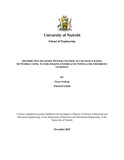| dc.contributor.author | Ondeng, Oscar | |
| dc.date.accessioned | 2016-04-25T06:55:54Z | |
| dc.date.available | 2016-04-25T06:55:54Z | |
| dc.date.issued | 2015-11 | |
| dc.identifier.uri | http://hdl.handle.net/11295/94971 | |
| dc.description.abstract | The electromagnetic spectrum is underutilized despite its physical scarcity. This underutilization is due to inefficient spectrum management techniques. Cognitive radio is a technology that can help achieve flexible spectrum management and thereby increase spectrum efficiency. In this research distributed transmit-power control in cognitive radio networks is studied and represented as a non-cooperative game-theoretic problem. The cognitive radio network is modeled as a single-cell Wide-band Code Division Multiple Access (W-CDMA) network with a number of mobile stations representing the players in the game-theoretic framework. In order to arrive at the Nash Equilibrium (NE) the Iterative Water-Filling (IWF) algorithm is implemented by employing the best response dynamic (BRP). Various characteristics of the NE are investigated such as the convergence speed, the power levels, the signal to interference and noise ratio (SINR) and the utility at NE. Quadrature Phase Shift Keying (QPSK) and Frequency Shift Keying (FSK) are also investigated and compared with respect to the NE and its characteristics. Sequential play is also compared to simultaneous play in the cognitive radio network.
The Nash Equilibrium is found not to be Pareto-optimal and the research presents an iterative algorithm to achieve a strategy that is Pareto-superior to the Nash Equilibrium. Based on the results of the algorithm, a method employing an equation is developed which enables a direct and faster attainment of the Pareto-superior strategy.
In the research a hybrid algorithm that interfaces Iterative Water-Filling and game-theoretic learning is also developed and implemented. The learning component of the game is adaptive and switches between two learning algorithms (Hedge Algorithm and Historical Matching Algorithm) based on the perceived operation of other players in the cognitive radio network. When compared with individual learning algorithms the hybrid-adaptive algorithm yields an improvement in the average utility of 12.65% over Iterative Water-Filling, 9.45% over Historical Matching Algorithm and 67.52% over the Hedge Algorithm. The Iterative Water-Filling component of the hybrid-adaptive algorithm is also seen to offer a convergence that is five times faster than the individual learning algorithms. The novel hybrid-adaptive algorithm offers an improvement on the previous treatments of Iterative Water-Filling and game-theoretic learning. All implementations and simulations are done using MATLAB R2011b. | en_US |
| dc.language.iso | en | en_US |
| dc.publisher | University of Nairobi | en_US |
| dc.rights | CC0 1.0 Universal | * |
| dc.rights.uri | http://creativecommons.org/publicdomain/zero/1.0/ | * |
| dc.subject | spectrum management, cognitive radio networks | en_US |
| dc.title | Distributed transmit power control in cognitive radio networks using water-filling interfaced with Game-theoretic learning | en_US |
| dc.type | Thesis | en_US |



